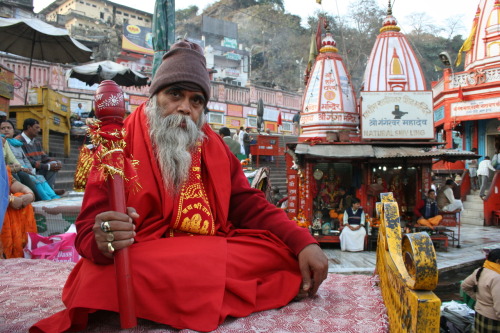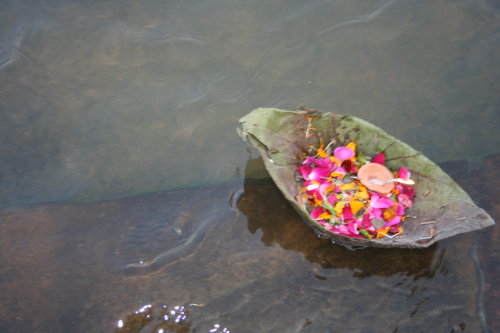
This weekend, some of the other volunteers (Laiah, Lindsay, and Shanta) and I decided to take a road trip to a holy city in Northern India call Haridwar and a nearby town Rishikesh. Early Saturday morning, Jasi (our favorite taxi driver) took us to the train station and wished us a “berry goot” trip. We settled into our seat in our section of “AC Chair Car” (exactly what it sounds like: a train car with chairs and fans). Like an airplane, they fed us questionable pre-made food and gave us newspapers. Later after the Indian man who had sat next to me left, the steward snuck up on me and held out some rupees asking for a tip. I could tell that I was being singled out because I was a tourist and there were no Indians around to tell him to go away but alas, I gave in and handed over ten rupees. Score: volunteers- zip, India- one.
 Four hours later we arrived at the Haridwar train station. It was a bit desolate and abandoned. There were only about five auto-rickshaws though there seemed to be a million drivers asking us if we needed a ride. We settled on the cheapest one and drove into town towards the temples. The streets of Haridwar were narrower than Delhi and if possible more crowed. Busy market stalls stood side by side creating narrow alleyways packed with people, cows, dogs, bikes, and rickshaws. The foothills of the Himalayas peeked through the ever-present smog. Shouts of “hello, ma’am come inside” rose above the honking from vendors sitting at the entry to their shops. Flies buzzed through the air and cows snatched food from roadside stands. We got tickets for the cable cars up to two temples (both temples were in the mountains). As we walked towards the entrance, tour guides insisted we needed an offering and of course they happened to sell some. We eventually were persuaded to buy a coconut offering complete with ribbon and rice puffs. Score: volunteers- zero, India: two. When we got to the cable cars, the chipped pastel paint with happy looking advertisements reminded me of the Ferris wheel at carnivals. As we climbed higher up the mountain, the city emerged from behind the tree line with the mighty Ganges winding through the tangle of roads and markets below. The sun caught the water and glistened through the haze. Monkeys danced in the trees below us and women carrying baskets of sticks glanced up at us as they walked along a dirt path.
Four hours later we arrived at the Haridwar train station. It was a bit desolate and abandoned. There were only about five auto-rickshaws though there seemed to be a million drivers asking us if we needed a ride. We settled on the cheapest one and drove into town towards the temples. The streets of Haridwar were narrower than Delhi and if possible more crowed. Busy market stalls stood side by side creating narrow alleyways packed with people, cows, dogs, bikes, and rickshaws. The foothills of the Himalayas peeked through the ever-present smog. Shouts of “hello, ma’am come inside” rose above the honking from vendors sitting at the entry to their shops. Flies buzzed through the air and cows snatched food from roadside stands. We got tickets for the cable cars up to two temples (both temples were in the mountains). As we walked towards the entrance, tour guides insisted we needed an offering and of course they happened to sell some. We eventually were persuaded to buy a coconut offering complete with ribbon and rice puffs. Score: volunteers- zero, India: two. When we got to the cable cars, the chipped pastel paint with happy looking advertisements reminded me of the Ferris wheel at carnivals. As we climbed higher up the mountain, the city emerged from behind the tree line with the mighty Ganges winding through the tangle of roads and markets below. The sun caught the water and glistened through the haze. Monkeys danced in the trees below us and women carrying baskets of sticks glanced up at us as they walked along a dirt path.
At the top, we entered Mansa-devi temple. We had no idea what to do with our coconut offering and watched the people in front of us as we approached the first statue. A man sitting by the god chanted and blessed us, painting a bindi on each of our foreheads. Then he explained that the gods accepts cash donations. Not wanting to offend (and also because of some extreme encouragement from the priest) we each set down more rupees. Score: volunteers- none, India- three. We turned around and repeated the same encounter at the next god statue. Volunteers-nada, India-four. Finally we realized we could simply walk by and politely bow or smile and keep our wallets intact. Back down the mountain, we took a bus and then another cable car to the second temple, Chandi-devi. The view from the top was even more striking at Chandi-devi, across the Ganges. There were no crowds and the air was quieter.
 Once we made our way back into Haridwar, we headed over to a nightly ceremony called Aati. Hundreds of people gathered along the river to bathe in the holy water and wait for sunset. As the colors of the sky changed, people lined up to place a boat made of leaves and filled with flowers into the water. Priests escorted the four of us to the water to help us with our blessings. After a prayer, the priest would explain a blessing and then say “donate as you like.” As you like was never quite enough though. “This prayer is for the long lives of your mother and father, anything will be accepted, now how much in dollars would you like to give? Ten rupees is not good, give in your money, give in dollars, ten dollars? Yes, ten dollars is good and how about for this blessing? Ten dollars also? Yes, of course, give dollars.” By the end of the prayer, the man expected about one hundred dollars, none of which I had agreed to. I was frustrated and handed over 100 rupees (about two bucks) after several stern scoldings. Finally, he lit a candle and handed me my leaf boat to set sail in the murky cold water. I watched as it floated away, flower petals drifting behind and thought of my 100 rupees. Volunteers- still zero, India- five.
Once we made our way back into Haridwar, we headed over to a nightly ceremony called Aati. Hundreds of people gathered along the river to bathe in the holy water and wait for sunset. As the colors of the sky changed, people lined up to place a boat made of leaves and filled with flowers into the water. Priests escorted the four of us to the water to help us with our blessings. After a prayer, the priest would explain a blessing and then say “donate as you like.” As you like was never quite enough though. “This prayer is for the long lives of your mother and father, anything will be accepted, now how much in dollars would you like to give? Ten rupees is not good, give in your money, give in dollars, ten dollars? Yes, ten dollars is good and how about for this blessing? Ten dollars also? Yes, of course, give dollars.” By the end of the prayer, the man expected about one hundred dollars, none of which I had agreed to. I was frustrated and handed over 100 rupees (about two bucks) after several stern scoldings. Finally, he lit a candle and handed me my leaf boat to set sail in the murky cold water. I watched as it floated away, flower petals drifting behind and thought of my 100 rupees. Volunteers- still zero, India- five.
Sunday morning, we awoke at our hotel in Rishikesh ready for a relaxing day. Rishikesh is about an hour north of Haridwar and the yoga capital of the world. International hippies lingered in the quiet town after last week’s World Yoga Festival. Indian men with long beards and bright orange robes tied yellow scarves over their dreadlocks. Cows napped in the streets while motorbikes zipped around them. Our hotel offered yoga classes in the morning and it was quite a way to start the day. After yoga we meandered through the streets, relishing the serene atmosphere. We walked past the hanging bridge to a temple towering over the river yet dwarfed by the foothills. Stairs led down to an alcove along the river where we sat and watched the water. Bells from the temple sang soft notes that joined with distant chanting. The Ganges lay still before us and the disarray of the streets and markets seemed so far away. For the first time, I didn’t notice the smog. I could breathe and think and soak in the beauty of the moment. Game point: volunteers- at peace, India- perfect.
Sitting in the CCS office back in Delhi, I look at the prayer beads on my wrist and remember the warm clean air, the bells, the flower petals, the men with dreadlocks, and the mountains and I breathe again.
No comments:
Post a Comment